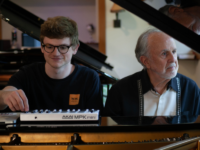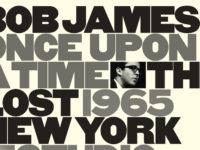Which jazz pianist who recorded his first album in 1962 went on to have a significant influence on contemporary music in the decades to follow? If you answered ‘Herbie Hancock,’ you’d be correct. Same if you answered with ‘Bob James.’ And also like Hancock, James is still very much in the game.
Espresso (August 31, 2018 from Evolution Music Group) is slated to be James’ first release as a leader since Urban Flamingo from 2006(!) and a sort-of return to where he’d begun, leading a piano trio with some new originals and old covers as he did with Bold Conceptions. But while James is feeling nostalgic, there are limits to his nostalgia, else he wouldn’t have picked dynamic players like Billy Kilson (drums) and the young, up-and-coming Michael Palazzolo (acoustic bass) to fill out his latest trio.
James has made some successful returns to his roots before (Straight Up and Take It From The Top) but he’s best known in the contemporary jazz arena, making a series of lite funk-jazz records in the mid-70s that were classics of the sub-genre and as one of the mainstays in the smooth jazz supergroup Fourplay since the early 90s. The Fourplay gig, various collaborative projects with David Sanborn and Nathan East and other musical endeavors have kept him plenty busy, and he didn’t really need to do this. But that was before being inspired to take another stab at leading a date following weeklong gig with Kilson and Palazzolo at New York’s Blue Note club last year.
“Bulgogi” signals that James’ trio is a democratic one, though Kilson’s forceful performance nearly pulls off a coup. The pianist showcases his fluid, nuanced and feathery touch, and an economy of notes that serves him well on his bop-oriented solo spotlight.
That said, James isn’t intent on pretending that JFK is president again. The first obvious sign of technological assistance comes on the second track “Shadow Dance,” where James’ piano is accompanied with light synth backing, but not enough to put off those averse to smooth jazz; focus instead on the moody melody that holds a lot more depth than anything merely ‘smooth.’ James’ composing skills have often been far more complex and thoughtful than he’s typically given credit for, and this is evidence he still has that ability. “Mojito Ride” is Exhibit Two.
“One Afternoon” takes a break from the trio format to place James’ piano in front of orchestral backing; it’s way more classical than jazz and features Angela Scates’ oboe. Though back at the trio, “Promenade” shares much of that classical feel with “One Afternoon.”
Some funk breaks out on the contemporary-minded “Topside,” even showcasing the pianist soloing a little on a synthesizer and electric piano, but Kilson’s high-hat groove makes this thing go. “Boss Lady” could have easily been one of the softer tunes of the album, but Palazzolo and Kilson simply refuse to let that happen, displaying muscularity that push this into being one of this collection’s strongest cuts.
Only one traditional jazz cover appears, and that’s Fats Waller’s “Ain’t Misbehavin’.” James opts for a swinging, slightly frisky approach that doesn’t take a lot of chances but is nonetheless a pleasant listen.
Two songs make a pretty convincing case for the enduring relevance of James’ work from many decades ago. His fingerprints were all over Grover Washington’s monster hit from 1975 “Mr. Magic” as conductor, arranger and Fender Rhodes captain. This contemporary version re-imagines Ralph McDonald’s and William Salter’s song by retaining the iconic vamp but with a new bass pattern. They also chop up the rhythmic pattern, which shows off the suppleness of the Kilson/Palazzolo unit over which James’ piano lightly prances. In place of Eric Gale’s unforgettable guitar solo, Palazzolo’s own aside acquits himself well.
“Submarine” is an update on James’ classic 1974 funk-jazz hip-hop fodder “Nautilus,” and appropriately, it’s the track that’s most like his 70s music. But in an ironic twist, as hip-hop artists incorporated “Nautilus” into their music, James returns the favor by assimilating many of the sounds of hip-hop into “Submarine” and does so while retaining his character. Which leads one to conclude that in some inadvertent way, he was a forbear forty-five years ago to one of the most popular forms of music today.
Espresso doesn’t always stick to the script of being an acoustic, piano/bass/drums trio playing straight-ahead jazz, but in the so-called war between the traditionalist and fusionistas/progressives in jazz, Bob James never really chose a side. His best music comes when he grounds himself firmly in both camps, as he does here.
- Christian Marien Quartett – ‘How Long Is Now’ (2024) - April 18, 2024
- Dave Douglas, feat. James Brandon Lewis – ‘Gifts’ (2024) - April 11, 2024
- Thollem – ‘Worlds In A Life, Two’ (2024) - April 8, 2024




